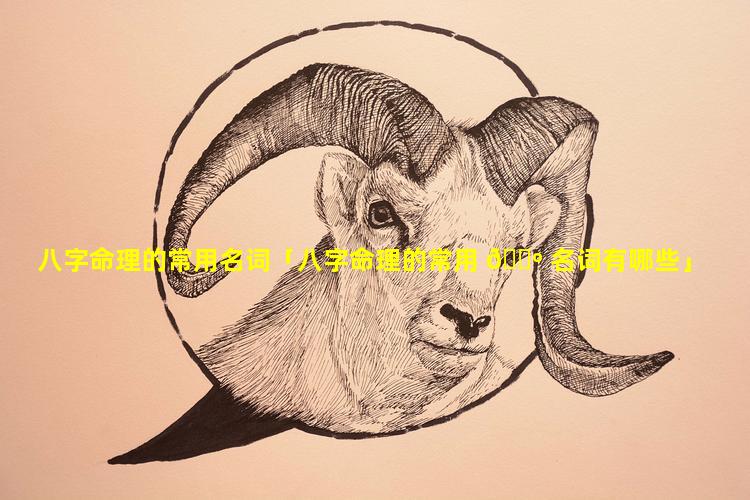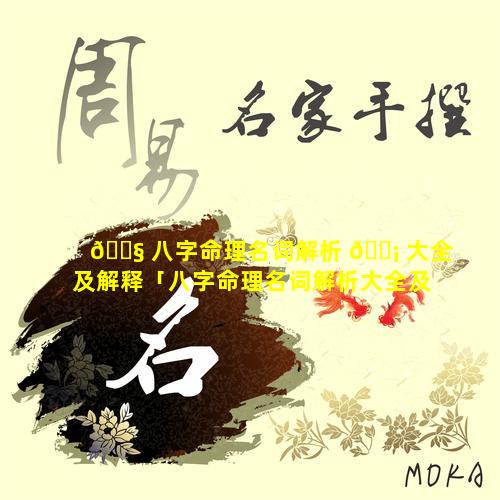命格的学术名词都有哪些呢
- 作者: 李颖熙
- 发布时间:2024-08-21
一、命格的学术名词都有哪些呢
命格的学术名词
八字命理四柱八字:出生年月日时的干支组合,共八个字。
干支:天干(甲、乙、丙、丁、戊、己、庚、辛、壬、癸)和地支(子、丑、寅、卯、辰、巳、午、未、申、酉、戌、亥)的组合。
五行:金、木、水、火、土五种元素。
十神:比肩、劫财、食神、伤官、偏财、正财、七杀、正官、偏印、正印。
神煞:天乙贵人、太极贵人、文昌贵人、桃花煞、天罗地网等。
紫微斗数命盘:以出生年月日时推算出的星盘。
十二宫:命宫、兄弟宫、夫妻宫、子女宫、财帛宫、疾厄宫、迁移宫、奴仆宫、官禄宫、田宅宫、福德宫、父母宫。
十四主星:紫微、天机、太阳、武曲、天同、廉贞、天府、太阴、贪狼、巨门、天相、天梁、七杀、破军。
辅佐星:左辅、右弼、文昌、文曲、天魁、天钺、禄存、天马等。
煞星:擎羊、陀罗、火星、铃星、地空、地劫等。
奇门遁甲九宫:天蓬、天任、天冲、天辅、天英、天芮、天柱、天心、天禽。
八门:开门、休门、生门、伤门、杜门、景门、死门、惊门。
九星:天蓬、天任、天冲、天辅、天英、天芮、天柱、天心、天禽。
八神:值符、腾蛇、太阴、六合、白虎、玄武、九地、九天。
三奇六仪:乙丙丁、戊己庚、辛壬癸。
六壬神课课体:以出生年月日时推算出的课格。
课式:六壬课、太乙课、奇门课等。
课神:六壬神、太乙神、奇门神等。
课格:天乙格、太乙格、六壬格等。
课应:课格所代表的吉凶祸福。
其他命理学:研究命格的学科。
命理师:精通命理学并为他人预测命格的人。
命书:记载命理学知识的书籍。
命理软件:用于推算命格的计算机程序。
二、命格的学术名词都有哪些呢英语
Destiny
FateKarma
Predestination
Providence

三、命格的学术名词都有哪些呢英文
Birth chart: A diagram that represents the positions of the planets, Sun, and Moon at the time of a person's birth.
Natal chart: Another term for birth chart.
Ascendant: The sign of the zodiac that was rising on the eastern horizon at the time of a person's birth.
Descendant: The sign of the zodiac that was setting on the western horizon at the time of a person's birth.
Midheaven: The point on the birth chart that represents the highest point in the sky at the time of a person's birth.
Imum Coeli: The point on the birth chart that represents the lowest point in the sky at the time of a person's birth.
Planets: The celestial bodies that are believed to influence a person's life, including the Sun, Moon, Mercury, Venus, Mars, Jupiter, Saturn, Uranus, Neptune, and Pluto.
Houses: The twelve divisions of the birth chart, each of which represents a different area of life.
Aspects: The angles between the planets on a birth chart, which are believed to indicate the relationships between different areas of a person's life.
Synastry: The comparison of two birth charts to determine the compatibility between two people.
四、命格有科学依据吗
命格的科学依据
命格,又称八字或四柱,是一种基于出生时间和地点的传统命理学体系。它认为一个人的命运是由出生时的天体位置决定的。
科学证据目前,没有科学证据支持命格的准确性。以下是一些原因:
缺乏可重复性:命格预测的准确性无法通过科学方法进行验证。不同的命理师对同一人的命格可能得出不同的结论。
样本偏差:命格研究通常依赖于小样本或轶事证据,这可能导致偏差和不准确性。
安慰剂效应:相信命格的人可能会无意识地影响自己的行为,从而使预测看起来准确。
自证预言:如果一个人相信自己的命格,他们可能会无意识地采取行动来实现它,从而创造一个自证预言。
相关性与因果关系
命格预测有时可能与实际结果相关,但这种相关性并不一定表明因果关系。例如,如果一个人的命格预测他们会富有,这并不意味着他们的财富是由出生时的天体位置造成的。相反,它可能是其他因素(例如教育、努力和机遇)导致了他们的财富。
结论目前,没有科学证据支持命格的准确性。命格预测是一种基于传统信仰和轶事证据的占卜形式,而不是基于科学原理。




